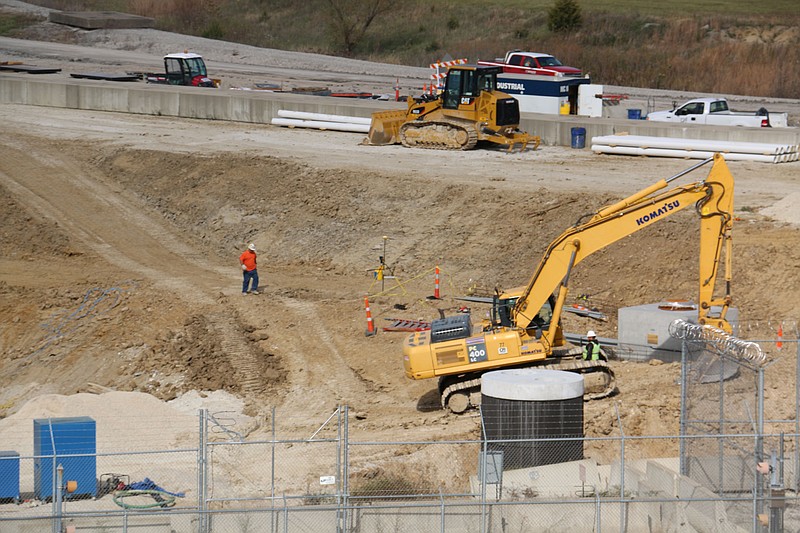Ameren Missouri's Callaway Energy Center is expecting to wrap up construction on its dry cask storage space by summer 2015. The dry cask storage, a structure that will be located on Ameren's Callaway Energy Center campus, will give Ameren the space it needs to store spent fuel assemblies through 2044.
Once construction is finished, the nuclear facility will transport some of its oldest spent nuclear fuel from its current pool storage to the dry storage.
While the U.S. Nuclear Regulatory Commission (NRC) does not require dry cask storage, utilities began using dry storage to better manage their spent fuel on site, according to an NRC spokesman. The NRC issues licenses for dry casks at nuclear power plants. It also has safety requirements for dry storage facilities and NRC inspectors certify that the power plants' dry storage complies with those requirements before allowing spent fuel to be moved.
Spent fuel, after a few years in the pool, has cooled and its radioactivity has decreased. At that time, it is safe to remove the fuel from the spent fuel pool to dry casks, according to the NRC's website. Doing so frees up space in the pool for nuclear plants to store more spent fuel that was more recently removed from the reactor.
Usually, dry casks have a sealed metal cylinder that contains spent fuel. That cylinder is then enclosed within a metal or concrete outer shell.
Missouri Coalition for the Environment (MCE) Safe Energy Director Ed Smith said the organization thinks the dry storage is a good idea.
"We do believe that it's a good idea to move spent fuel from pools to casks, especially since Ameren has a rather crowded spent fuel pool," Smith said.
Ameren is waiting to hear from the NRC on its application for a 20-year license renewal. The plant's current license expires in 2024.
If the NRC approves the nuclear facility's license renewal application, the Callaway plant's license would be extended to 2044. The dry cask storage will help the plant have long-term storage through that potential license renewal.
The NRC could approve Ameren Missouri's license renewal for the plant in mid-December. However, Smith said a recent lawsuit could be a factor in that process and he could see the suit potentially delay a decision on the nuclear facility's application for a license renewal.
MCE recently joined a lawsuit filed in the U.S. Court of Appeals that challenges the NRC's newly revised Continued Storage of Spent Nuclear Fuel Rule. The rule's revision was the NRC's response to a previous court ruling.
After the end of the repository program at Yucca Mountain in 2012, the U.S. Court of Appeals for the District of Columbia Circuit, according to the U.S. Energy Information Administration, struck down provisions of the NRC's Waste Confidence Rule, which dealt with issues regarding long-term storage of radioactive waste.
The NRC then suspended all actions related to issuing license renewals and new operating licenses. In late October of this year, with the NRC's revised and renamed Continued Storage of Spent Nuclear Fuel Rule, it resumed issuing license renewals of nuclear facilities. Smith said he thinks it would be wise for the NRC to hold off on issuing the Callaway plant's license renewal.
"Practically speaking, it would be in, I think, the best interest of everyone to delay that decision until after this court challenge is finalized and (they) see what's happening with the waste confidence or storage rules because those are fundamentally important to the issuance of a license extension," Smith said.
An NRC spokesperson told the Fulton Sun that the NRC is on schedule to complete its review of the Callaway's plant's license renewal application next month.


